In the ever-evolving automotive landscape, compact SUVs and hatchbacks are increasingly becoming popular choices for urban dwellers and small families. Today, we delve into a head-to-head comparison between the Toyota Yaris Cross and the VW Polo, two contenders in the compact category that boast innovative features, impressive specifications, and distinctive designs. Let's explore how these vehicles stack up against each other in various aspects, from their engines to their consumption rates.
Toyota Yaris Cross vs VW Polo – Performance, range & efficiency compared
Both models have their strengths – but which one suits you more?
Compare performance, efficiency, price and space directly: Toyota Yaris Cross or VW Polo?
Body Type and Design
The Toyota Yaris Cross is categorized as a compact SUV, offering drivers higher ground clearance, a commanding driving position, and rugged aesthetics. Its bold design, characterized by a strong front fascia and muscular contours, resonates well with those who lean towards an adventurous lifestyle.
On the other hand, the VW Polo presents itself as a classic hatchback. Known for its clean lines and contemporary styling, it appeals to a younger demographic looking for a practical yet stylish vehicle. The Polo's compact design makes it perfectly suited for urban environments, squeezing into tight parking spots with ease.
Engine Performance
Under the hood, the Yaris Cross features a full hybrid engine that generates between 116 and 130 horsepower, thanks to its 1.5-liter 3-cylinder unit. It boasts an efficient fuel consumption of 4.5 to 4.8 L/100km, making it a front-runner in terms of eco-friendliness. The Yaris Cross is also equipped with a Continuously Variable Transmission (CVT), ensuring seamless acceleration for city driving.
In contrast, the VW Polo offers a range of petrol engines, from a modest 80 HP to a robust 207 HP for those seeking performance. Its engine options include 1.0-liter and 2.0-liter variants, leading to varied consumption rates that range from 5.2 to 6.5 L/100km. The Polo also features optional manual and automatic transmissions, catering to drivers' preferences.
Acceleration and Speed
For those who value speed, the Toyota Yaris Cross processes a respectable 0-100 km/h acceleration time ranging from 10.7 to 11.3 seconds, with a top speed capped at 170 km/h. This enables it to comfortably keep up in day-to-day driving scenarios.
The VW Polo, however, showcases its performance prowess with a 0-100 km/h time as quick as 6.5 seconds in its sportier variants, pushing the limits of compact performance. It offers top speeds that vary depending on the engine variant, with the highest reaching 240 km/h. This impressive performance undoubtedly appeals to those who desire a thrilling driving experience.
Interior Space and Comfort
In terms of interior space, the Yaris Cross comfortably accommodates five passengers, providing ample room for adults without compromising on luggage space, with trunk capacities ranging from 320 to 397 liters.
The VW Polo likewise maintains a five-seater layout, though it lags slightly behind in trunk space with a maximum of 351 liters. It’s well-regarded for its quality materials and ergonomic design, creating a cozy and comfortable driving experience.
Innovative Features and Technology
The Yaris Cross comes equipped with advanced safety features and Toyota’s latest tech offerings, including a high-tech infotainment system compatible with both Android Auto and Apple CarPlay. Its hybrid technology not only enhances efficiency but also promotes a quieter ride.
Meanwhile, the VW Polo continues to impress with its suite of driver-assistance technologies, including adaptive cruise control, lane-keeping assistance, and a user-friendly infotainment system that boasts sharp graphics and responsive performance.
Conclusion: Which One Wins?
Choosing between the Toyota Yaris Cross and the VW Polo ultimately depends on personal preferences and lifestyle. If you prioritize eco-friendly driving and the advantages of an SUV, the Yaris Cross is an excellent choice. Conversely, if you seek spirited performance in a compact footprint, the VW Polo should be your go-to option. Both vehicles showcase innovation and efficiency, adhering to the demands of modern urban driving.
Here’s where it gets real: The technical differences in detail
Costs and Efficiency:
Price and efficiency are key factors when choosing a car – and this is often where the real differences emerge.
VW Polo has a noticeable advantage in terms of price – it starts at 17000 £, while the Toyota Yaris Cross costs 23700 £. That’s a price difference of around 6690 £.
Fuel consumption also shows a difference: Toyota Yaris Cross manages with 4.50 L and is therefore a bit more efficient than the VW Polo with 5.10 L. The difference is about 0.60 L per 100 km.
Engine and Performance:
Under the bonnet, it becomes clear which model is tuned for sportiness and which one takes the lead when you hit the accelerator.
When it comes to engine power, the VW Polo has a evident edge – offering 207 HP compared to 130 HP. That’s roughly 77 HP more horsepower.
In acceleration from 0 to 100 km/h, the VW Polo is decisively quicker – completing the sprint in 6.50 s, while the Toyota Yaris Cross takes 10.70 s. That’s about 4.20 s faster.
In terms of top speed, the VW Polo performs distinct better – reaching 240 km/h, while the Toyota Yaris Cross tops out at 170 km/h. The difference is around 70 km/h.
Space and Everyday Use:
Beyond pure performance, interior space and usability matter most in daily life. This is where you see which car is more practical and versatile.
Both vehicles offer seating for 5 people.
In curb weight, VW Polo is hardly perceptible lighter – 1143 kg compared to 1180 kg. The difference is around 37 kg.
In terms of boot space, the Toyota Yaris Cross offers to a small extent more room – 397 L compared to 351 L. That’s a difference of about 46 L.
In maximum load capacity, the VW Polo performs hardly perceptible better – up to 1125 L, which is about 28 L more than the Toyota Yaris Cross.
When it comes to payload, Toyota Yaris Cross somewhat takes the win – 510 kg compared to 457 kg. That’s a difference of about 53 kg.
Who comes out on top?
Overall, the VW Polo shows itself to be outperforms in nearly all aspects and secures the title of DriveDuel Champion.
It convinces with the more balanced overall package and proves to be the more versatile choice for everyday use.
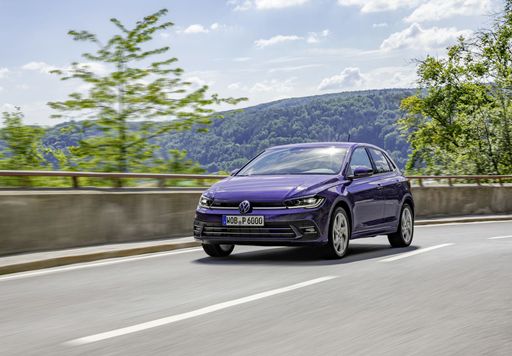 @ Volkswagen AG / VW Media
@ Volkswagen AG / VW Media
VW Polo
Toyota Yaris Cross
The Toyota Yaris Cross takes the jaunty personality of the Yaris and gives it a taller stance and a bit more practicality, so you get city-friendly agility with added SUV presence. It’s easy to live with, economical on the daily grind, and smartly packaged — a sensible pick for buyers who want fuss-free transport with a touch of character.
details @ Toyota Motor Corporation
@ Toyota Motor Corporation
 @ Toyota Motor Corporation
@ Toyota Motor Corporation
 @ Toyota Motor Corporation
@ Toyota Motor Corporation
 @ Toyota Motor Corporation
@ Toyota Motor Corporation
 @ Toyota Motor Corporation
@ Toyota Motor Corporation
 @ Toyota Motor Corporation
@ Toyota Motor Corporation
 @ Toyota Motor Corporation
@ Toyota Motor Corporation
VW Polo
The Polo is a small car with surprisingly grown-up refinement, delivering comfortable packaging, crisp handling and a build quality that punches above its class. For buyers who want a practical, fuss-free hatch that still feels a little premium, it’s a sensible, slightly cheeky choice you’ll enjoy every day.
details @ Volkswagen AG / VW Media
@ Volkswagen AG / VW Media
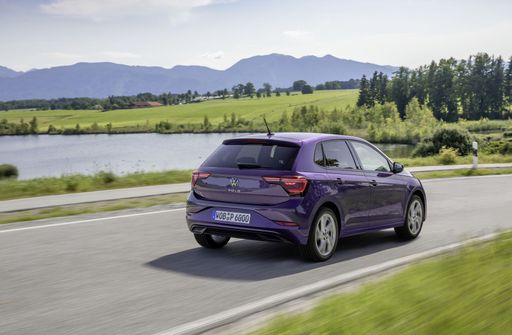 @ Volkswagen AG / VW Media
@ Volkswagen AG / VW Media
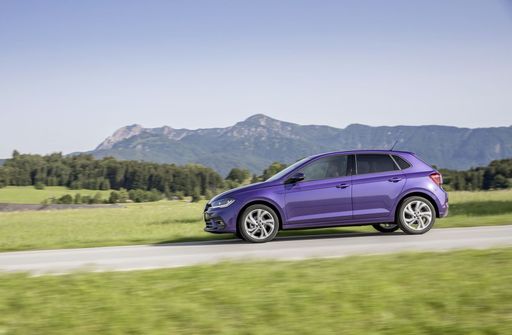 @ Volkswagen AG / VW Media
@ Volkswagen AG / VW Media
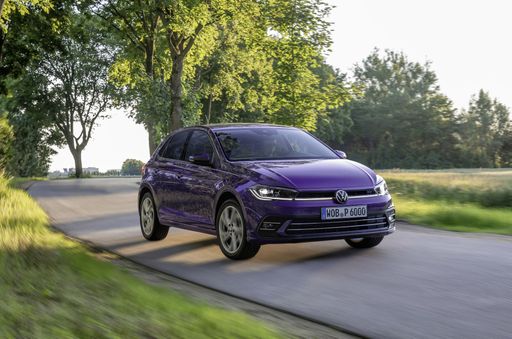 @ Volkswagen AG / VW Media
@ Volkswagen AG / VW Media
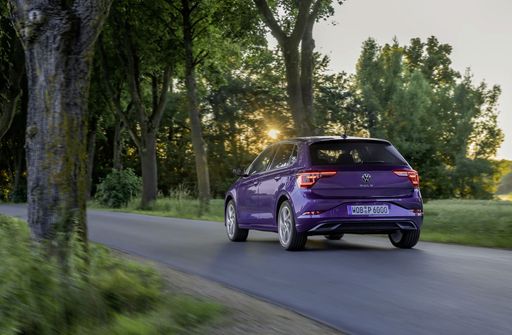 @ Volkswagen AG / VW Media
@ Volkswagen AG / VW Media
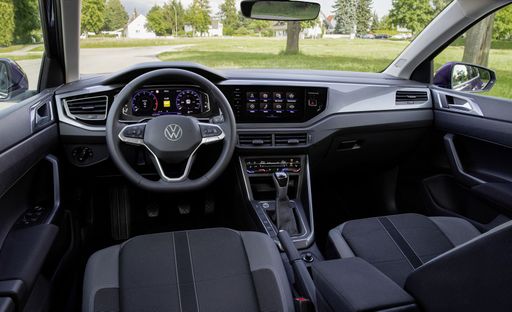 @ Volkswagen AG / VW Media
@ Volkswagen AG / VW Media
 @ Toyota Motor Corporation
@ Toyota Motor Corporation
|
 @ Volkswagen AG / VW Media
@ Volkswagen AG / VW Media
|
|
|
|
Costs and Consumption |
|
|---|---|
|
Price
23700 - 34300 £
|
Price
17000 - 30400 £
|
|
Consumption L/100km
4.5 - 4.8 L
|
Consumption L/100km
5.1 - 6.5 L
|
|
Consumption kWh/100km
-
|
Consumption kWh/100km
-
|
|
Electric Range
-
|
Electric Range
-
|
|
Battery Capacity
-
|
Battery Capacity
-
|
|
co2
101 - 108 g/km
|
co2
116 - 148 g/km
|
|
Fuel tank capacity
36 L
|
Fuel tank capacity
40 L
|
Dimensions and Body |
|
|---|---|
|
Body Type
SUV
|
Body Type
Hatchback
|
|
Seats
5
|
Seats
5
|
|
Doors
5
|
Doors
5
|
|
Curb weight
1180 - 1290 kg
|
Curb weight
1143 - 1378 kg
|
|
Trunk capacity
320 - 397 L
|
Trunk capacity
351 L
|
|
Length
4180 mm
|
Length
4074 mm
|
|
Width
1765 mm
|
Width
1751 mm
|
|
Height
1595 mm
|
Height
1431 - 1451 mm
|
|
Max trunk capacity
1097 L
|
Max trunk capacity
1125 L
|
|
Payload
485 - 510 kg
|
Payload
432 - 457 kg
|
Engine and Performance |
|
|---|---|
|
Engine Type
Full Hybrid
|
Engine Type
Petrol
|
|
Transmission
Automatic
|
Transmission
Manuel, Automatic
|
|
Transmission Detail
CVT
|
Transmission Detail
Manual Gearbox, Dual-Clutch Automatic
|
|
Drive Type
Front-Wheel Drive, All-Wheel Drive
|
Drive Type
Front-Wheel Drive
|
|
Power HP
116 - 130 HP
|
Power HP
80 - 207 HP
|
|
Acceleration 0-100km/h
10.7 - 11.3 s
|
Acceleration 0-100km/h
6.5 - 15.6 s
|
|
Max Speed
170 km/h
|
Max Speed
171 - 240 km/h
|
|
Torque
-
|
Torque
93 - 320 Nm
|
|
Number of Cylinders
3
|
Number of Cylinders
3 - 4
|
|
Power kW
85 - 96 kW
|
Power kW
59 - 152 kW
|
|
Engine capacity
1490 cm3
|
Engine capacity
999 - 1984 cm3
|
General |
|
|---|---|
|
Model Year
2024 - 2025
|
Model Year
2024 - 2025
|
|
CO2 Efficiency Class
C
|
CO2 Efficiency Class
D, E
|
|
Brand
Toyota
|
Brand
VW
|
Is the Toyota Yaris Cross offered with different drivetrains?
Available configurations include Front-Wheel Drive or All-Wheel Drive.
The prices and data displayed are estimates based on German list prices and may vary by country. This information is not legally binding.
